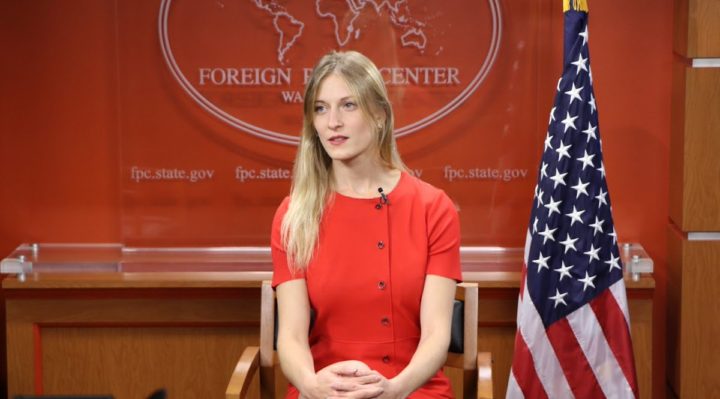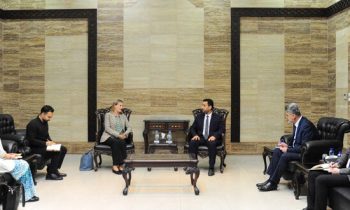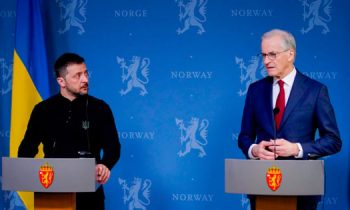Carrie Filipetti, Deputy assistant secretary for Cuba and Venezuela, responded on Tuesday to the MEDIA during a press teleconference that if the security forces of the president in dispute, Nicolás Maduro, came to arrest Juan Guaidó, the United States would respond with more actions than have already been imposed to date.
“Russians and the Cubans is that they are willing to sacrifice their own strength and their own power to go down with Maduro. We’re frankly surprised, because when they look at the Maduro regime, there – it’s clear that there’s incompetence, it’s clear that there’s undemocratic principles, there’s dictatorship, there’s violence, there’s intimidation, there’s harassment, there’s human rights violations. And the Cubans and the Russians have decided to throw their weight behind that, both in terms of financial support, but also in terms of surveillance support and military support when it comes to the Cuban regime. So we are very focused on making sure that these two pillars of support for the Maduro regime are no longer able to sustain it” , Carrie Filipetti said to Media.

Below is a full rush transcript of the press conference by Carrie Filipetti, Deputy Assistant Secretary of State for Cuba and Venezuela for the State Department’s Bureau of Western Hemisphere Affairs.
DAS Filipetti: Thank you very much, As you all know, this past Sunday, January 5th, saw the reelection of Juan Guaido as the President of the National Assembly and, therefore, a continuation of his interim presidency this year. Following this vote, which has 100 deputies out of 167 voting for President Guaido, dozens of countries have come out in support of his reelection and rejecting the violent attempts of the Maduro regime to block this vote.
But what happened on Sunday is actually two stories. First, there’s the story of Guaido’s re-election on Sunday. But second, there’s the story of the regime’s approach to elections writ large, and this is a key story because it’s the origin of this crisis in the first place. For years now, we’ve seen the regime’s violence and desperation. UN High Commissioner for Human Rights Michelle Bachelet has highlighted this in a series of reporting about the dire human rights situation in Venezuela with Maduro’s death squads being responsible for over 7,000 extrajudicial killings in a period of 18 months and with hundreds of political prisoners continuing to languish in Venezuelan prisons.
We’ve seen reporting on the manipulation of humanitarian aid, the theft of hundreds of millions of dollars from food programs, and the violence and intimidation used to buy – try to buy the votes of deputies in advance of Sunday’s elections – in some cases, offering hundreds of thousands of dollars for a single vote.
But what’s important to remember is that these efforts failed. Democracy in Venezuela is not for sale. And the 100 deputies who came out to El Nacional proved that. Principles cannot be bought, and when the regime realized this, they panicked. And in their desperation, they called on the military to abandon its traditional purpose of defending and protecting the constitution, and instead prioritize partisanship over the people. We have all seen the images of Guaido and other deputies trying to access the National Assembly building only to be illegally blocked by these military leaders.
And this is where the story of the regime’s approach to elections comes in. Elections under the Maduro regime are why we are in the political, economic, and humanitarian crisis we are in. He stole the presidential elections of 2018, he attempted and failed to steal Sunday’s election. But even the national guard’s guns could not stop democracy. And it’s important to note that he will try to steal the upcoming National Assembly elections and any presidential elections that are determined.
So this is why U.S. policy has supported a transitional government to oversee presidential elections because National Assembly elections in 2020 will not solve this crisis; only a presidential election will. And this Sunday proved without a shadow of a doubt that Maduro is incapable of overseeing free and fair elections. So free and fair presidential elections under a transitional government are not only the only way to stop the usurpation, they’re also the only way to stop the violence, the intimidation, the murder, the human rights violations. And it’s not just a political issue; this is a moral one. Maduro’s massive failure first to buy votes, and then to block the election with physical violence has galvanized the United States and the international community in support of the reelection of Guaido and securing an end to this crisis.
And I’ll just give one final note that’s very timely, given it’s now 9:30 on Tuesday. Today the National Assembly plans to meet for its usual Tuesday session. The Maduro regime showed its colors on Sunday and we fully expect, and are already seeing them begin to deploy, the same dictatorial, violent tactics they used on Sunday to keep the majority of democratically-elected deputies out of the building. But 100 of the 167 deputies support Guaido – that is far beyond a quorum. It is unconstitutional to prevent them from entering the building and it’s unconstitutional for them to host a meeting without a quorum.
The National Assembly is the last bastion of democracy in Venezuela, and we will continue to support it and President Guaido against the regime’s criminal and thuggish behavior. As I’ve said, democracy can’t be bought and won’t intimidate the National Assembly. Guaido proved that on Sunday, and we will continue to prove that today and everyday going forward until the end of this crisis.
Question: Mrs. Secretary, the Venezuelan citizens in the last couple of days do this simple math: the United States got Soleimani out of the way because he was a threat to national security in the region and because he was the leader of violent repression against the populations in the countries around. But United States want a specific and negotiated outcome in Venezuela while Maduro is killing his own people, has given passports and refuge to terrorists, has sent his chancellor to meet Hizballah’s general secretary in Lebanon, and he’s exploiting his violence to the rest of the region, destabilizing countries in your own front yard. What would you tell them?
DAS Filipetti: Thank you for that question. So obviously, you’ve highlighted exactly the problem: the Maduro regime continues to murder and torture and intimidate the Venezuelan people. This isn’t a question of counting time based on days; it’s counting time based on the number of deaths that the Maduro regime is perpetuating. And so we are 100 percent committed to the resolution of this crisis. We believe that the resolution of this crisis will be brought about through a transitional government that will lead to free and fair presidential elections, and we plan on helping the international community understand what those free and fair conditions look like. These are based on international standards, these are based on the Venezuelan constitution, and it’s critical that we try to resolve this crisis as quickly and as peacefully as possible.
Question: A year after you recognized and many other countries recognized Guaido, the Maduro regime is still firmly in power despite sweeping sanctions against it from the United States. So what are you going to do in 2020 to bring about the transition that you seek; what further measures do you plan to take; will they go beyond individual sanctions; will they include, for example, a naval blockade of Venezuela?
DAS Filipetti: Thank-you, I can’t preview any specific actions, but what I can say is that we will be continuing our strategy of working to support the National Assembly and Interim President Juan Guaido, as well as continuing our sanctions policies to the extent that we need to. Pressuring the Maduro regime is critical because it’s that pressure that has gotten the regime to come to the table in the first place. They have not negotiated in good faith. We need to make sure they understand that time is not on their side, and if they want to participate in a negotiation, it needs to be a true negotiation where they are discussing how to get to a transitional government to lead to presidential elections. So we will be continuing on that policy as we go forward.
I also think that we saw something really critical on Sunday, which is that we’ve known for the past year that Maduro lacks support of the people of Venezuela. This is exactly why he tried to buy votes, as opposed to just relying on having them. But he wasn’t able to. And then we saw him rely on the tactic that he has used throughout 2019, which is violence and intimidation, and even that now is failing him.
And so we’ve seen how Guaido has defeated these attempts to – of intimidation, of violence, and a physical blockade, and he still was able to win re-election. So the regime pulled out all the stops and they utterly failed, and I think this is an example that even his brutality and intimidation will not be successful in 2020.
Question: What is the U.S. prepared to do if Maduro and his loyal forces, the military, the police, lash out against Juan Guaido or National Assembly members?
DAS Filipetti: I mean, this is something that we need to pay attention to. We have seen that the Maduro regime is increasingly desperate, and increasingly desperate regimes resort to increasingly brutal tactics. We saw that on Sunday. This was not a technique that the Maduro regime had to deploy in May 2018. They were able to manipulate the election in other ways, but now they’ve moved to brute force.
It is critical that we ensure that the people of Venezuela do not get attacked by the Venezuelan military. We need to make sure – you know, a lot of the Venezuelan military, they’re being mistreated by the Maduro regime as well. A lot of the officers have been thrown in prison. They are having loyalty checks that are done on them by the Cubans. It’s important that we recognize that and we try to highlight those divisions to show that the military needs to be on the right side of history here.
Question: I just wanted to ask whether the United States is going to be able to release any aid to the Venezuelan opposition this year. I know there was an attempt last year to get appropriations of some money which is badly needed by the opposition in order to fund activities, particularly in the diplomatic missions abroad, and they’ve complained that it’s been very slow to get hold of this money. I wondered if there’s been any progress on that ?
DAS Filipetti: The U.S. was able to pass last year a development agreement that USAID is implementing, and they have been implementing those funds. We are working through implementing partners who are working with the National Assembly, who are working with Interim President Guaido’s team to make sure that the needs of the democratic actors are being meet. And then, of course, we also have our additional humanitarian assistance which is going directly to the people of Venezuela through our implementing partners as well.
Question: The power of Russia and Cuba and the support they need to give Venezuela were underestimated. In what term was it underestimated? When United – when did the United States start changing their measures to be more effective with this kind of problems with Russia and Cuba in Venezuela?
DAS Filipetti: What we’ve realized with the Russians and the Cubans is that they are willing to sacrifice their own strength and their own power to go down with Maduro. We’re frankly surprised, because when they look at the Maduro regime, there – it’s clear that there’s incompetence, it’s clear that there’s undemocratic principles, there’s dictatorship, there’s violence, there’s intimidation, there’s harassment, there’s human rights violations. And the Cubans and the Russians have decided to throw their weight behind that, both in terms of financial support, but also in terms of surveillance support and military support when it comes to the Cuban regime.
So we are very focused on making sure that these two pillars of support for the Maduro regime are no longer able to sustain it. I think focusing on the international support for the Maduro regime is critical, because anybody who looks at what happened on Sunday needs to recognize and acknowledge that this was a violation of Venezuelan sovereignty, a violation of the Venezuelan constitution, and a violation of democratic principles. And anyone who stands behind that has made it clear where they stand.
Question: Do you see any military presence of Russia in Venezuela now, and do you observe any ins and outs of Russian military groups to Venezuela?
DAS Filipetti: Thanks, So we have seen some Russian technical military presence inside Venezuela. We’ve seen that since March of 2019 when we first announced that we were seeing some Russian troops landing inside Venezuela. I would note that the National Assembly has not given any authorization for the Russians, the Cubans, or any other foreign military officials to be inside Venezuela, so therefore, their presence is also a violation of Venezuelan sovereignty and illegal under Venezuelan domestic law.
Question: Juan Guaido is outside the building where the National Assembly sessions, and he still can’t get in. So two hypothetical situations. What will happen or what will America do in case of Juan Guaido doesn’t get the opportunity to get inside of the building, or what will happen, what will do if he gets arrested by the Maduro task forces?
DAS Filipetti: Thanks, So with the second question first, I mean, I think you all have seen the tactics that the U.S. Government has used and deployed throughout the course of the last year. If there was something like an escalation, an arrest of Guaido, et cetera, I think you would see even additional actions far beyond what we have pushed out to date. And of course, it would be completely unacceptable as well to our international partners who have made it clear that there is a line in the sand when it comes to Guaido’s security. He is legitimately elected by the National Assembly as the President, and of course, was elected to the National Assembly by the people of Venezuela.
When it comes to your first question, this is something we’re tracking very closely. It’s important to remember that the building is not the democratic process. The democratic process is the ability of elected officials to meet together to discuss policies that will help the people of Venezuela. And so if they can’t get into the building, then I suspect that they will go somewhere else where they will have a quorum and have a constitutional basis for holding a discussion to try to resolve this crisis and to try to provide for the people of Venezuela. So if Luis Parra and 18 other people decide to stay in the National Assembly building, well, they don’t have a quorum. They have no authority to be there. They were not elected to that position according to the Venezuelan constitution, and we’ll focus on where the actual National Assembly is meeting.
DAS Filipetti: Thank-you very much. I would just say we appreciate everybody’s interest in this. I think watching what happens today, as Herbert mentioned, Juan Guaido is attempting to get into the National Assembly building. We are continuing to see the Maduro regime deploy these violent tactics. I think it’s very important that we all continue to monitor the situation and recognize that the Maduro regime’s attempts to manipulate January 5th were a complete failure.



